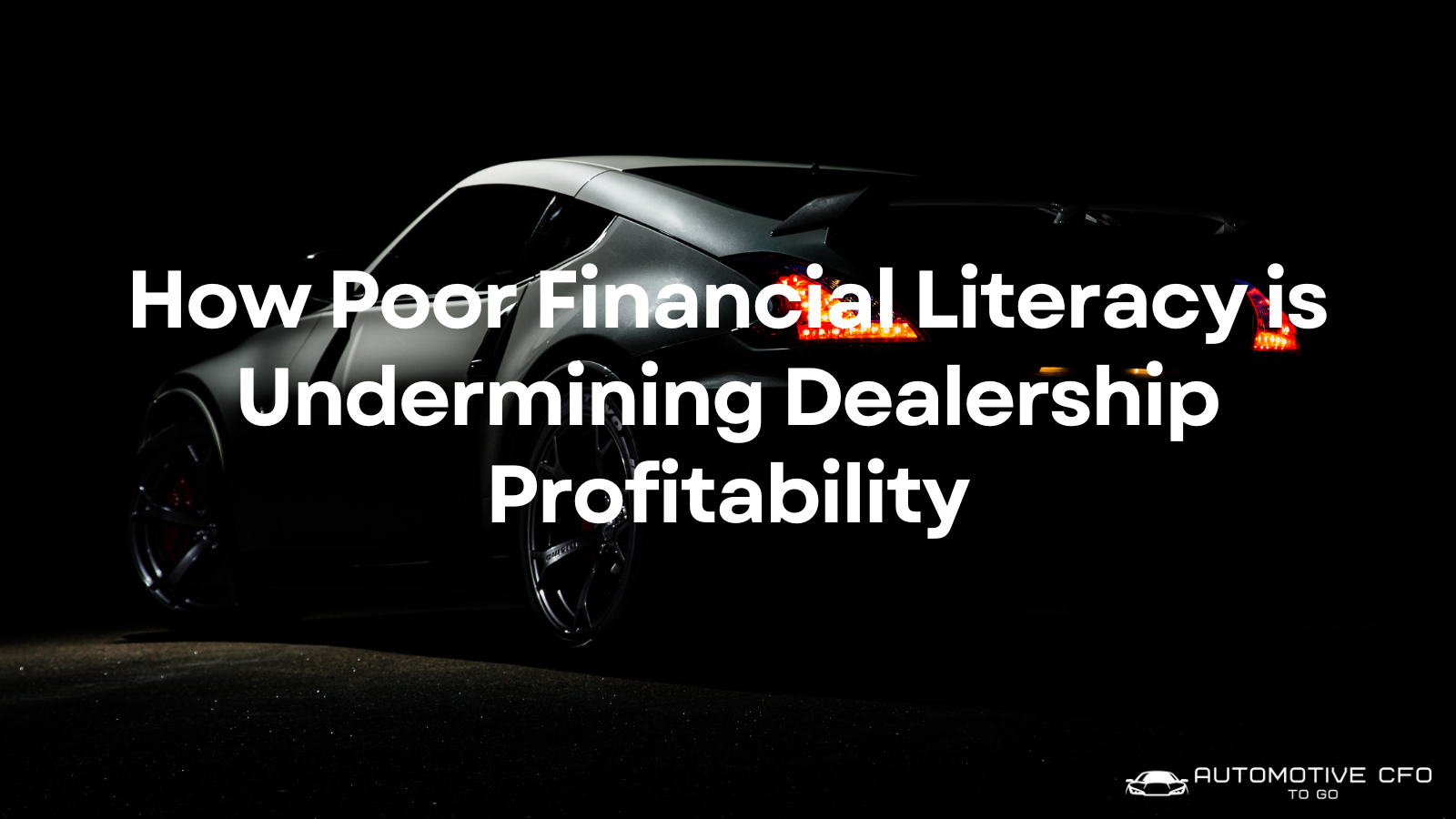 Financial literacy in a dealership is like knowing how to swim before jumping into the deep end—technically, you can still jump in without it, but the results will be unpleasant for everyone involved.
Financial literacy in a dealership is like knowing how to swim before jumping into the deep end—technically, you can still jump in without it, but the results will be unpleasant for everyone involved.
For a General Manager and a Controller, understanding financials isn’t just a nice-to-have; it’s what allows them to make decisions that don’t result in frantic emails, emergency meetings, or a vague hope that “things will just work out.”
When GMs and Controllers know their numbers, they can align operational goals with financial realities, avoid unnecessary missteps, and—best of all—keep the dealership profitable enough to pay for the goodies in the customer lounge.
But when both the GM and Controller lack financial literacy, it’s like asking two people who get lost in their own neighborhood to plan a cross-country road trip. They’ll take wrong turns with total confidence, burn through the budget on unnecessary detours, and ultimately arrive at a place that looks nothing like the brochure.
Meanwhile, the dealership is left chasing sales that don’t materialize, spending money it doesn’t have, and wondering why cash flow feels more like a trickle than a stream.
Without a basic grasp of key financial metrics—or at least the ability to fake it convincingly—leadership will struggle to spot problems before they become full-blown crises. They’ll miss opportunities, fail to adapt to market changes, and generally operate with the same financial foresight as someone who just bought a timeshare because “it seemed like a good deal.” And in the end, the dealership’s long-term success will be about as secure as a folding chair in a hurricane.
Poor financial literacy significantly undermines dealership profitability.
The hidden cost of financial ignorance is often more expensive than you realize.
-
Inadequate expense management: Many dealership GMs and controllers lack the financial expertise to identify and control unnecessary spending, leading to reduced profitability despite strong sales and revenue.
-
Misalignment of expenses with gross profit: Without a solid understanding of dealership financial KPIs, dealers struggle to maintain a healthy financial position and keep expenses within manufacturer-specific benchmark percentages of gross profit.
-
Ineffective interpretation of financial statements: GMs often make their way up to management via the sales floor. More often than not, they come to the table with a limited understanding of financial statements, focusing primarily on daily sales figures while struggling to interpret income statements and balance sheets effectively.
-
Suboptimal pricing strategies: Financial illiteracy can lead to poor pricing decisions, such as offering deep discounts that may deteriorate brand value and make it difficult to increase prices in the future.
-
Inadequate cash flow management: Failure to anticipate and plan for cash flow challenges, especially in the early stages of business, can jeopardize a dealership’s current and future financial stability.
-
Missed opportunities in F&I products: Lack of financial knowledge may result in dealers not fully leveraging Finance and Insurance (F&I) products, which generate high profit margins and ongoing revenue. This allows customers to stop seeing F&I as an add-on, but rather an added value built into their vehicle purchase. Integrating F&I into all dealership activities creates opportunities for customers, staff, and overall profitability.
-
Tax-related issues: Insufficient understanding of federal and state tax requirements can lead to problems with the IRS, and in California, the Franchise Tax Board, Employment Development Dept, State Board of Equalization and more(!), potentially resulting in interest, penalties and audits.
-
Inability to weather economic downturns: Without a solid understanding of financial principles, GMs and Controllers may struggle to navigate the complexities of dealership profitability—especially during economic downturns. When sales slow, expenses rise, or interest rates shift, leaders without strong financial literacy may rely on gut feelings rather than data-driven decisions. This can lead to knee-jerk cost-cutting that harms long-term growth, mismanagement of cash flow, or an inability to identify and address inefficiencies.
Financially savvy leadership, on the other hand, can anticipate challenges, adjust pricing strategies, optimize expenses, and leverage financial tools like forecasting and budgeting to sustain profitability. They understand how to manage inventory without overextending, control variable costs, and maintain healthy margins even when market conditions are volatile.
Ultimately, a dealership’s ability to survive and thrive in difficult times depends not just on selling cars, but on leadership that understands the financial levers that keep the business stable and profitable.
To address these issues, GMs, Controllers and key staff members should focus on improving financial literacy, implementing regular forecasting, departmental expense reviews, and utilizing key performance indicators (KPIs) to optimize operations and financial outcomes.
Tips to improve dealership profitability through financial literacy
- Review the monthly financial statements together every month to analyze trends and variances.
- If you’re uncertain about something, ask. Don’t let hesitation stand in the way of gaining knowledge. No one has all the answers, and every question you ask helps strengthen the team.
- Join a Dealer 20 Group. Yes, it takes time away from the store but you’ll find that learning about what others are doing, and what the benchmarks are, greatly improves your financial literacy.
- Invest in training to ensure both roles are proficient in financial statement analysis, KPIs, timely processes (including a 3-day close) and error-free credible reporting.
When the GM and the Controller enhance their financial literacy it fosters better alignment between operational goals and financial realities, improving decision-making, profitability, and long-term growth for the dealership.
Like this post? Subscribe to the Kruse Control Newsletter. Get more cutting-edge insights, exclusive content, and a dash of humor delivered weekly to your inbox!
